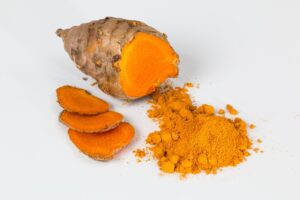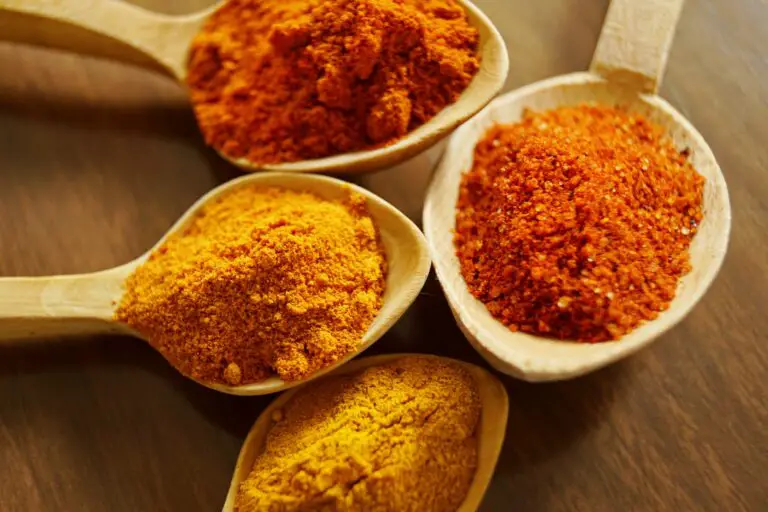Turmeric, a vibrant golden spice known for its distinctive flavor and potential health benefits, has gained popularity not only in culinary uses but also in alternative medicine. People have turned to turmeric for its potential to alleviate various health issues and improve overall well-being. However, it’s crucial to explore the question: “Are there any side effects or interactions with turmeric?”
What is Turmeric?
Turmeric, scientifically known as Curcuma longa, is a flowering plant belonging to the ginger family. Native to South Asia, it has a long history of traditional use in Ayurvedic and Chinese medicine. The active compound responsible for its vibrant color and potential health benefits is called curcumin. Curcumin is often extracted from turmeric and used in dietary supplements for its potential medicinal properties.

Why Do People Eat Turmeric?
People have incorporated turmeric into their diets due to its potential health benefits. Research suggests that curcumin, the active compound in turmeric, possesses antioxidant and anti-inflammatory properties, which could be beneficial in various conditions. Some studies have shown that curcumin may aid in reducing blood cholesterol levels, supporting cardiovascular health. It has also been investigated for its potential to lower blood sugar levels, making it an area of interest for individuals with diabetes.
Additionally, turmeric has been explored for its role in cancer prevention and treatment. Research on animals and cells indicates that curcumin inhibits the proliferation of cancer cells, such as lncap prostate cancer cells and human prostate cancer cells. However, more research is needed to fully understand its effects on various cancer types in humans.
Adverse Effects of Turmeric
While turmeric offers potential health benefits, it’s essential to consider its potential adverse effects. Some individuals may experience gastrointestinal discomfort, including stomach upset or acid reflux, when taking turmeric or curcumin supplements. Those with stomach disorders or gastroesophageal reflux disease (GERD) should exercise caution when using turmeric.
Turmeric’s ability to affect blood clotting is another consideration. Curcumin might have blood-thinning properties, which could be problematic for individuals taking blood thinners or other medications that affect clotting. It’s crucial to consult a healthcare provider before incorporating turmeric supplements, especially if you have bleeding problems or are scheduled for a medical procedure.
How to Ensure Turmeric Quality
To maximize the potential benefits and minimize the risks of consuming turmeric, it’s essential to consider the quality of the product. When choosing turmeric supplements, opt for reputable brands that provide information about the source of their turmeric and the curcumin content. Look for products that have been third-party tested for quality and purity.

When using turmeric or curcumin extracts, start with a low dose to assess your tolerance and any potential adverse effects. If you’re taking other medications, especially blood thinners, diabetes medications, or hormone-sensitive medications, consult your healthcare provider before adding turmeric to your routine. They can help you navigate potential interactions and monitor your health.
What Cannot Be Taken With Turmeric?
Turmeric, specifically its active compound curcumin, is generally considered safe for most people when used in culinary amounts or taken as a dietary supplement. However, there are certain medications and health conditions that might interact with turmeric or its components, potentially causing adverse effects. Here are some substances and situations that should be approached cautiously or avoided when taking turmeric:

- Blood Thinners (Anticoagulants/Antiplatelet Medications): Turmeric has natural blood-thinning properties, and consuming it alongside medications like warfarin, aspirin, clopidogrel, or other anticoagulants/antiplatelet drugs can increase the risk of bleeding or bruising. Combining turmeric with these medications may lead to excessive bleeding.
- Diabetes Medications: Turmeric may lower blood sugar levels, which can be problematic when combined with diabetes medications. The combination might lead to excessively low blood sugar levels (hypoglycemia). It’s important for individuals with diabetes to monitor their blood sugar levels closely when using turmeric supplements.
- Stomach Disorders and GERD: Turmeric may exacerbate stomach disorders or gastroesophageal reflux disease (GERD) symptoms in some individuals. The spice can increase stomach acid production, potentially causing discomfort or acid reflux.
- Hormone-Sensitive Conditions and Medications: Curcumin in turmeric might have hormonal effects and interfere with hormone-sensitive conditions like breast cancer, uterine fibroids, or endometriosis. If you have such conditions or are taking hormone-related medications, consult your healthcare provider before using turmeric supplements.
- Gallbladder Issues: Turmeric might worsen gallbladder problems or bile duct obstruction. If you have a history of gallbladder issues or are prone to gallstones, it’s advisable to consult your healthcare provider before using turmeric.
- Pregnancy and Breastfeeding: While turmeric is commonly used in culinary amounts, its concentrated extracts and supplements might not be safe during pregnancy or breastfeeding. Consult a healthcare professional before using turmeric supplements during these periods.
- Upcoming Surgery or Medical Procedures: Due to its potential blood-thinning effects, it’s recommended to stop using turmeric supplements at least two weeks before undergoing surgery or any medical procedure to reduce the risk of excessive bleeding.
- Iron Absorption: High doses of turmeric might interfere with the absorption of dietary iron, which could be problematic for individuals with iron-deficiency anemia or those relying on iron supplements.
- Specific Medications: Turmeric might interact with certain medications, including certain antibiotics, antacids, and drugs that affect the liver’s metabolic processes. Always consult your healthcare provider before combining turmeric supplements with prescription medications.
It’s important to note that individual responses can vary, and while some people might experience interactions or adverse effects, others may not. If you’re considering using turmeric supplements for specific health purposes, it’s highly recommended to consult a healthcare professional before doing so. They can provide personalized guidance based on your medical history, current medications, and health conditions, helping you make informed decisions about incorporating turmeric into your routine.
Are There Any Side Effects or Interactions with Turmeric? – Final Thoughts
In the realm of alternative medicine, turmeric and its active compound, curcumin, have shown promise in various health areas. While research suggests potential benefits such as reducing blood cholesterol, supporting diabetes management, and even aiding in cancer prevention, it’s important to approach turmeric consumption with caution. Are there any side effects or interactions with turmeric? Yes, there can be adverse effects, particularly for individuals with existing health conditions or those taking specific medications.
As with any herbal supplement, it’s wise to consult a healthcare professional before incorporating turmeric into your routine, especially in medicinal forms or concentrated extracts. While turmeric can offer potential health benefits, its interactions with medications and potential effects on blood clotting need to be taken into account. By making informed choices and prioritizing your health and safety, you can reap the potential rewards of turmeric while minimizing its risks.

